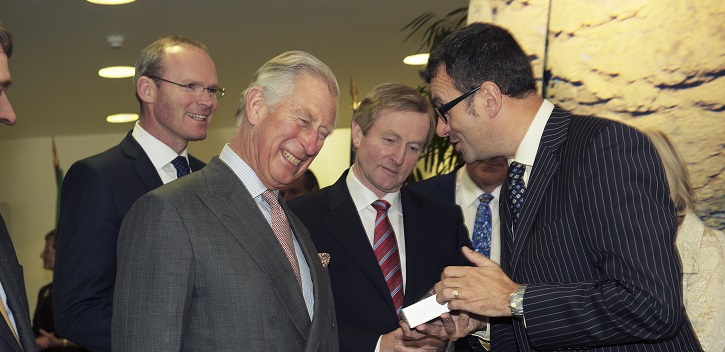UCC geologist presents Mullaghmore coral to Prince Charles

During Prince Charles's visit to the Marine Institute in Galway, Professor Andy Wheeler gave the prince a gift of a cut and polished fossil coral with a poignant personal message.
"Although the Prince is going to visit Mullaghmore, he will not have time to visit the spectacular fossil coral beds at Streedagh Point nearby," said Professor Wheeler.
Mullaghmore is where the Prince's great-uncle and godfather, Lord Mountbatton, was assassinated by the IRA in 1979.
"I explained to the Prince that the coral is 335 million years old and lived in a tropical sea next to a landmass that had no name and no flag. The coral has seen the ancient tribes of Ireland come and go, the Normans, the Plantagenet’s, the Tudors, the British Empire and the Troubles. But all of this is just a fleeting moment in the coral’s extraordinary history", explained Professor Wheeler.
"The coral gives a message of warm tropical peaceful seas, of hope and a perspective" said Professor Wheeler.
Professor Andy Wheeler is the Professor of Geology at University College Cork and has been involved in ocean exploration for many years. He was meeting HRH Prince Charles and the Taoiseach at the Marine Institute Headquarters to show findings from a deep-sea volcanic system discovered during an Irish-led, Irish-British Expedition to the mid-Atlantic Ridge.
"Professor Wheeler was able to impress on the Prince and Taoiseach that Ireland is able to perform world-class research in deep, volcanic hostile environments 3 km beneath the waves," said Dr Michael Murphy, President of University College Cork, "It was a pleasure working with the British on this landmark discovery".
The discovery of the Moytirra hydrothermal vent (black smoker) on the mid-Atlantic Ridge was undertaken on-board the Irish research vessel RV Celtic Explorer using the Holland I ROV (remotely operated vehicle). The expedition was showcased by National Geographic Television (Alien Deep) and was a discovery of the only known black smoker between the Azores and Iceland on the mid-Atlantic ridge. Moytirra is a site where volcanic fluids at over 450oC vent from the seabed creating towers of metal sulphides and supporting ecosystems independent from life elsewhere on the planet.
The coral presented to Prince Charles is a Siphonophyllia samsonensis, also known as the horn coral, and is a large solitary rugose coral which can grow up to nearly a metre long. Now extinct, these corals thrived in the warm shallow tropic seas in the lower Carboniferous (Asbian, upper Visean) between 333 and 337 million years ago and are well exposed in Co. Sligo.
During the visit, His Royal Highness heard about the first trans-Atlantic mapping survey to take place under the Atlantic Ocean Research Alliance between the EU, Canada and USA. The Irish-led survey will begin on 1st June when the RV Celtic Explorer sails from St John’s Newfoundland to Galway.
HRH The Prince of Wales welcomed the Galway Statement, which established the Atlantic Ocean Research Alliance, as an important step in improving international co-operation in understanding the impact of climate change on the oceans.
Professor Wheeler is a co-founder of the new €17.8m SFI Irish Centre for Research in Applied Geosciences (iCRAG) bringing together teams of geosciences researchers with a clear focus on the economic impact. Geoscience underpins the discovery of raw materials, water and energy resources that are critical to the world’s economy. With increasing demand and diminishing supply, focused innovations in geoscience are of paramount importance globally. Ireland is home to Europe’s largest zinc mine, untapped hydrocarbon resources and important untapped seabed and groundwater resources. iCRAG will carry out research to find and harness these resources whilst protecting the environment.
iCRAG is funded under the SFI Research Centres Programme and is co-funded under the European Regional Development Fund.
